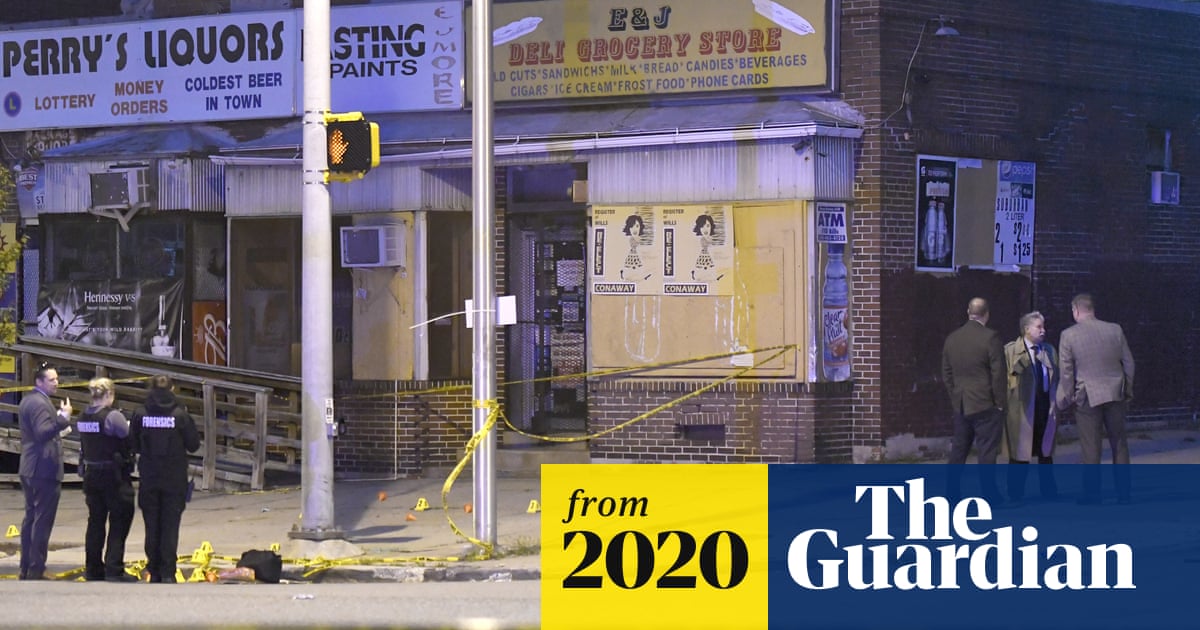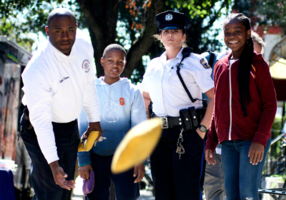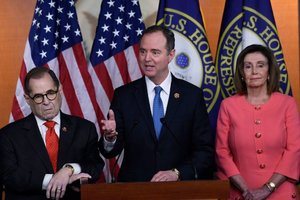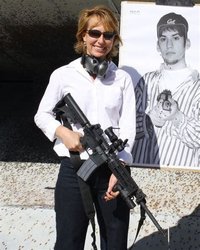mikeyp
NES Member
From a Gifford's report 

 www.theguardian.com
www.theguardian.com
Police brutality, over-enforcement of small infractions and high numbers of unsolved homicides have eroded trust in law enforcement
The lack of trust between law enforcement and the communities they serve is a major driver of gun violence in cities across the United States, a new report by the Giffords Law Center to Prevent Gun Violence warns.
In many American communities, acts of police brutality, over-enforcement targeting small infractions and high numbers of unsolved shootings and homicides have eroded trust, making residents less likely to place their trust in law enforcement and more likely to seek vigilante justice, the researchers note.
“Everybody has largely missed the fact that if people can’t count on help from the state and its agents, they’re going to take care of themselves,” says David Kennedy, the director of the National Network for Safe Communities, a violence reduction research center, whose work is referenced throughout the report. “Sometimes taking care of yourself looks like day-to-day gun violence.”
The report also spotlights examples of trends in cities like Camden, New Jersey, and Oakland, California, where community-led efforts have led to a significant decrease in gun violence rates.
“Communities have the answers and can address and treat gun violence. But law enforcement gets the lion’s share of any city budget in the country,” says Fernando Rejón, the director of the Urban Peace Institute, a not-for-profit organization that trains violence interventionists. “For a [violence reduction] strategy to work, law enforcement needs to be able to do their work, intervene and provide alternatives, but there also has to be community investment.”
‘A racial injustice’
Gun violence in America is still highly geographically concentrated and disproportionately affects black and Latino communities in city neighborhoods. African Americans make up more than half of all homicide victims in America, according to the report. Black men comprise less than 7% of the US population, but 51% of gun homicide victims. In 2016, homicide was responsible for more deaths among black men between the ages of 15 and 24 than every other cause of death combined.
More than half of homicides of black Americans don’t lead to an arrest, the report notes, and nearly three-quarters of all unsolved murders in these cities have involved a victim who was black.
“We hear about disproportionate impact and it’s important to speak clearly about how that’s a racial injustice,” says Ari Freilich, a lead author of the report and policy director at Giffords. “That number would be unheard of in every high-income country in the world.”
Most homicides are perpetrated by a very small percentage of the population, often known to law enforcement. Street groups involved in violence constitute on average less than 0.6% of a city’s population, with an even smaller percentage of that group actually perpetrating violent crimes.
And yet in communities across the country, including some of those hardest hit by gun violence, researchers documented a concerning combination of distrust in law enforcement, underreporting of crimes, declines in witness cooperation and engagement with officers, less informed policing, unsolved murders and spikes in violence.
Instead of acknowledging this complicated phenomenon, many departments uphold myths of cities described as “murder capitals”, where residents are accused of being complacent about gun violence and unwilling to help police hold shooters accountable.
“So much of what isn’t working about traditional policing is built on myths and leads to policies that treat whole communities as part of the problem rather than victims, witnesses and the solution to violence,” says Freilich.
“Law enforcement are inheritors of a history of racism and violence,” Freilich adds. “And police are frequently tasked with implementing and enforcing racist laws.”
“When you are thinking of an entire community as violent you flood neighborhoods with all kinds of enforcement,” says Jesse Jannetta, a senior policy fellow at the Urban Institute.
“Rather, if you can identify a small number who are at an elevated risk of shooting and being shot it opens up a number of intervention possibilities.”
Violence prevention
The report also puts local knowledge and experiences on a national stage, highlighting examples of cities with successful collaborations between communities and law enforcement, as well as police departments that have made progress in confronting the history of racial violence that looms over departments.
“We know a bunch of issues are real, it’s our kids that are dying,” says Reygan Cunningham, a senior partner with the California Partnership for Safe Communities, a not-for-profit that seeks to build collaborations between law enforcement and violence reduction groups. “But people don’t hold official power. Putting this on a national platform forces officials to wrestle with this.”
In Oakland, California, gun homicides dropped 44% between 2007 and 2018, a Guardian analysis found. The drop coincided with a rise in clearance rates for homicides, and with the growth of collaborations between local faith leaders and grassroots organizers who have pushed the police departments to adopt progressive policing practices.
“Law enforcement became more effective,” the Giffords report says of Oakland. “Homicide solve rates rose from 29% in 2011 to over 70% six years later, suggesting that community trust and partnership were improving, too.”
Even though Oakland has made massive strides, gun violence remains a stubborn issue throughout the city. In 2019 Oakland saw 74 murders in 2019, significantly fewer than years before but a small uptick from the 67 homicides in 2018.
While the role of law enforcement officials in violence prevention remains polarizing in some communities, many say that law enforcement participation is essential if the downward trend will be sustained.
“Police action and inaction are a really big part of the problem. Still I don’t think we’ll make the progress we want if police aren’t a part of our agenda,” says Vaughn Crandall, the co-director of the California Partnership for Safe Communities.
“I think depending solely on community efforts to solve your violence problems is unfair and unrealistic.”
Stockton, California, a small city located in the state’s Central Valley, is one of the few Bay Area towns that saw an uptick in gun homicides between 2007 and 2017.
Since then, the total number of homicides in the city has declined from 55 in 2017, to 33 in 2018. The city closed 2019 with 34 homicides.
The Stockton police chief, Eric Jones, has gained praise for implementing and being an early adopter of racial reconciliation practices between police officers and the communities they serve.
Jones and his staff hold monthly trust-building sessions in the city, where together officers and residents confront the historical pain that policing has caused in communities of color, which he describes as a sometimes uncomfortable but necessary task.
“It’s painful for everyone but they’re undeniable facts,” says Jones.
“We tell officers, “It wasn’t you, but there’s a burden on the badge you wear: from slave patrols to enforcing Jim Crow laws, and the suppression of civil rights.”

Distrust of police is major driver of US gun violence, report warns
Police brutality, over-enforcement of small infractions and high numbers of unsolved homicides have eroded trust in law enforcement
Police brutality, over-enforcement of small infractions and high numbers of unsolved homicides have eroded trust in law enforcement
The lack of trust between law enforcement and the communities they serve is a major driver of gun violence in cities across the United States, a new report by the Giffords Law Center to Prevent Gun Violence warns.
In many American communities, acts of police brutality, over-enforcement targeting small infractions and high numbers of unsolved shootings and homicides have eroded trust, making residents less likely to place their trust in law enforcement and more likely to seek vigilante justice, the researchers note.
“Everybody has largely missed the fact that if people can’t count on help from the state and its agents, they’re going to take care of themselves,” says David Kennedy, the director of the National Network for Safe Communities, a violence reduction research center, whose work is referenced throughout the report. “Sometimes taking care of yourself looks like day-to-day gun violence.”
The report also spotlights examples of trends in cities like Camden, New Jersey, and Oakland, California, where community-led efforts have led to a significant decrease in gun violence rates.
“Communities have the answers and can address and treat gun violence. But law enforcement gets the lion’s share of any city budget in the country,” says Fernando Rejón, the director of the Urban Peace Institute, a not-for-profit organization that trains violence interventionists. “For a [violence reduction] strategy to work, law enforcement needs to be able to do their work, intervene and provide alternatives, but there also has to be community investment.”
‘A racial injustice’
Gun violence in America is still highly geographically concentrated and disproportionately affects black and Latino communities in city neighborhoods. African Americans make up more than half of all homicide victims in America, according to the report. Black men comprise less than 7% of the US population, but 51% of gun homicide victims. In 2016, homicide was responsible for more deaths among black men between the ages of 15 and 24 than every other cause of death combined.
More than half of homicides of black Americans don’t lead to an arrest, the report notes, and nearly three-quarters of all unsolved murders in these cities have involved a victim who was black.
“We hear about disproportionate impact and it’s important to speak clearly about how that’s a racial injustice,” says Ari Freilich, a lead author of the report and policy director at Giffords. “That number would be unheard of in every high-income country in the world.”
Most homicides are perpetrated by a very small percentage of the population, often known to law enforcement. Street groups involved in violence constitute on average less than 0.6% of a city’s population, with an even smaller percentage of that group actually perpetrating violent crimes.
And yet in communities across the country, including some of those hardest hit by gun violence, researchers documented a concerning combination of distrust in law enforcement, underreporting of crimes, declines in witness cooperation and engagement with officers, less informed policing, unsolved murders and spikes in violence.
Instead of acknowledging this complicated phenomenon, many departments uphold myths of cities described as “murder capitals”, where residents are accused of being complacent about gun violence and unwilling to help police hold shooters accountable.
“So much of what isn’t working about traditional policing is built on myths and leads to policies that treat whole communities as part of the problem rather than victims, witnesses and the solution to violence,” says Freilich.
“Law enforcement are inheritors of a history of racism and violence,” Freilich adds. “And police are frequently tasked with implementing and enforcing racist laws.”
“When you are thinking of an entire community as violent you flood neighborhoods with all kinds of enforcement,” says Jesse Jannetta, a senior policy fellow at the Urban Institute.
“Rather, if you can identify a small number who are at an elevated risk of shooting and being shot it opens up a number of intervention possibilities.”
Violence prevention
The report also puts local knowledge and experiences on a national stage, highlighting examples of cities with successful collaborations between communities and law enforcement, as well as police departments that have made progress in confronting the history of racial violence that looms over departments.
“We know a bunch of issues are real, it’s our kids that are dying,” says Reygan Cunningham, a senior partner with the California Partnership for Safe Communities, a not-for-profit that seeks to build collaborations between law enforcement and violence reduction groups. “But people don’t hold official power. Putting this on a national platform forces officials to wrestle with this.”
In Oakland, California, gun homicides dropped 44% between 2007 and 2018, a Guardian analysis found. The drop coincided with a rise in clearance rates for homicides, and with the growth of collaborations between local faith leaders and grassroots organizers who have pushed the police departments to adopt progressive policing practices.
“Law enforcement became more effective,” the Giffords report says of Oakland. “Homicide solve rates rose from 29% in 2011 to over 70% six years later, suggesting that community trust and partnership were improving, too.”
Even though Oakland has made massive strides, gun violence remains a stubborn issue throughout the city. In 2019 Oakland saw 74 murders in 2019, significantly fewer than years before but a small uptick from the 67 homicides in 2018.
While the role of law enforcement officials in violence prevention remains polarizing in some communities, many say that law enforcement participation is essential if the downward trend will be sustained.
“Police action and inaction are a really big part of the problem. Still I don’t think we’ll make the progress we want if police aren’t a part of our agenda,” says Vaughn Crandall, the co-director of the California Partnership for Safe Communities.
“I think depending solely on community efforts to solve your violence problems is unfair and unrealistic.”
Stockton, California, a small city located in the state’s Central Valley, is one of the few Bay Area towns that saw an uptick in gun homicides between 2007 and 2017.
Since then, the total number of homicides in the city has declined from 55 in 2017, to 33 in 2018. The city closed 2019 with 34 homicides.
The Stockton police chief, Eric Jones, has gained praise for implementing and being an early adopter of racial reconciliation practices between police officers and the communities they serve.
Jones and his staff hold monthly trust-building sessions in the city, where together officers and residents confront the historical pain that policing has caused in communities of color, which he describes as a sometimes uncomfortable but necessary task.
“It’s painful for everyone but they’re undeniable facts,” says Jones.
“We tell officers, “It wasn’t you, but there’s a burden on the badge you wear: from slave patrols to enforcing Jim Crow laws, and the suppression of civil rights.”
- This article was amended on 21 January 2020 to correct the total number of homicides in Stockton between 2015 and 2017, and for the year 2018.






